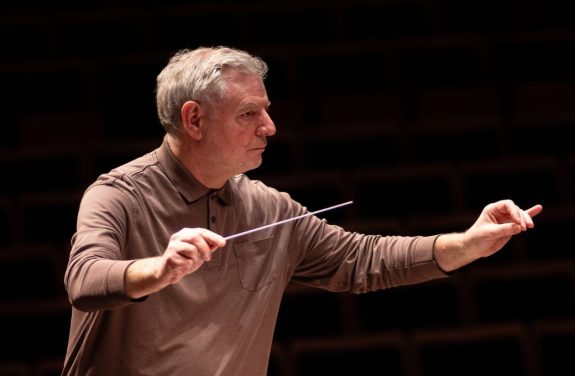 United Kingdom Brahms, Vaughan Williams: Boris Giltburg (piano), Bournemouth Symphony Orchestra / Karl-Heinz Steffens (conductor). The Lighthouse, Poole, 21.2.2024. (CK)
United Kingdom Brahms, Vaughan Williams: Boris Giltburg (piano), Bournemouth Symphony Orchestra / Karl-Heinz Steffens (conductor). The Lighthouse, Poole, 21.2.2024. (CK)

Brahms – Piano Concerto No.2
Vaughan Williams – A London Symphony
A musical friend of mine used to enjoy recalling a concert from his boyhood – in Portsmouth, I believe – in which Sir John Barbirolli had conducted Elgar’s Second Symphony. Before raising his baton, he turned to the audience and asked whether the work had been played there before. ‘No, sir’, a voice responded. ‘Well,’ said Sir John, ‘you’re in for a treat!’
There are several reasons why this story came to my mind at this Bournemouth Symphony Orchestra performance of Vaughan Williams’s A London Symphony. I was excited by the prospect of hearing a work I hadn’t heard in concert since a performance over 50 years ago in Leeds Town Hall, conducted by Walter Susskind (who was also the conductor from whom I first heard the music of Mahler). I knew I was in for a long-awaited treat. Secondly, like that long-ago Portsmouth audience, I had the impression from the comments I heard around me both before and after the performance that many people hadn’t heard the piece and knew nothing about it. And thirdly, it is such a wonderful and overwhelmingly beautiful work, packed with incident, that I cannot understand why it is not performed as often as Elgar’s two symphonies. No veiled criticism of Elgar there: I simply believe that this work belongs in their company. Vaughan Williams’s middle symphonies are rightly held in high critical regard (though also seldom performed): but the London was his own favourite, and it is music that is easy to love, impossible not to be moved by.
On this occasion the evocative opening – like skeins of mist on the Thames – had to make its way against an intermittent barrage of coughing (forgivable in a dank February), but after the Westminster chimes on the harp we were up and away: memorable ideas tumble over each other in this opening movement, dousing us with everything from cockney high spirits to hymn-like nobility. The music has the luminous freshness of all Vaughan Williams’s work around this period – The Lark Ascending, the Tallis Fantasia, the Overture The Wasps, the song-cycle On Wenlock Edge. The composer uses his expanded orchestral resources – a pair of cornets added to the trumpet section, a percussion battery requiring five players – with full-hearted skill: and the BSO responded in kind. The seasoned German conductor Karl-Heinz Steffens seemed completely at home with the music’s very English idiom. Harp and string sextet introduced a central episode of other-worldly beauty before we were swept up again towards the pealing jubilation of the close.
In the atmospheric slow movement – like one of Atkinson Grimshaw’s nocturnal townscapes, with gas lights and wet streets and the distant jingle of a hansom cab – many of the Bournemouth players touched in brief but telling solos: cor anglais, a gentle horn and trumpet, viola, harp, clarinet. The music took on a folk-like character before ascending to a great visionary climax, winding down finally to a lone viola. Difficult not to think of Wordsworth on Westminster Bridge a century earlier: And all that mighty heart is lying still. Too much description of the music? I am sorry: but who else was writing music like this?
The Scherzo seems jaunty – there is an agile bassoon – but unexpected vistas open up, and the end is darkly mysterious: presaging, perhaps, the unmistakeable cry of anguish that opens the Finale (reminding us that the symphony is – among other things – an elegy for Vaughan Williams’s younger friend and fellow-composer George Butterworth, killed on the Somme). A sombre but noble march suggests a sadness: for all the foregoing music’s vividness, the vision of Edwardian London is slipping away from us into the past. For Vaughan Williams and his contemporaries, a terrible war had rendered it lost, never to be recovered. The Epilogue, which brings a measure of peace as the Westminster chimes sound again and fade, was most beautifully played. Vaughan Williams apparently had in mind some words about the inexorable passing of time by H.G Wells: but, identifying with the music, I think of the closing words of The Great Gatsby: So we beat on, boats against the current, borne back ceaselessly into the past.
It was a wonderful performance: and it was clear from the orchestra’s spontaneous and unanimous ovation for conductor Steffens that they knew, as we did, that under his guidance they had produced something truly special.
I have left little space to do justice to Boris Giltburg’s titanic performance of Brahms’s Second Piano Concerto before the interval, which made this concert memorable before a note of the Vaughan Williams Symphony was played. Slight and rather boyish in appearance, Giltburg had enormous reserves of firepower – and of musing poetry, too – to open up whole worlds of feeling and imagination in this concerto, regarded by most pianists, so I am told, as the most difficult in the repertoire. Thrilling in the first movement, tempestuous in the second, his playing held us in thrall: after all the sound and fury, the cello solo that opens the slow movement fell like balm. There was lovely sostenuto playing by the woodwinds in this movement too: and in the finale Giltburg’s note of playfulness, even whimsy, contrasted strongly with what had gone before. He made me listen to the music afresh: Brahms is completely orthodox, for example, in keeping the trumpets and drums silent in the slow movement, but I had not previously realised that he writes nothing for them in the finale either. The whole trajectory of the piece became clearer. The audience’s reaction was fervent and impassioned, and rightly so.
Chris Kettle
